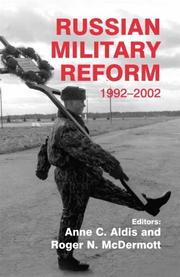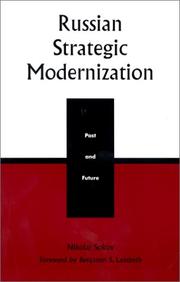| Listing 1 - 10 of 37 | << page >> |
Sort by
|
Book
Year: 1997 Publisher: London : RISCT,
Abstract | Keywords | Export | Availability | Bookmark
 Loading...
Loading...Choose an application
- Reference Manager
- EndNote
- RefWorks (Direct export to RefWorks)

ISBN: 0714654752 Year: 2003 Publisher: London : Frank Cass,
Abstract | Keywords | Export | Availability | Bookmark
 Loading...
Loading...Choose an application
- Reference Manager
- EndNote
- RefWorks (Direct export to RefWorks)
Book
ISBN: 0855160942 Year: 1994 Publisher: London : Royal United Services Institute for Defence Studies,
Abstract | Keywords | Export | Availability | Bookmark
 Loading...
Loading...Choose an application
- Reference Manager
- EndNote
- RefWorks (Direct export to RefWorks)
Book
ISBN: 9780998666013 0998666017 173527528X Year: 2018 Publisher: Washington: The Jamestown Foundation,
Abstract | Keywords | Export | Availability | Bookmark
 Loading...
Loading...Choose an application
- Reference Manager
- EndNote
- RefWorks (Direct export to RefWorks)
Russia's Military Strategy and Doctrine is designed to educate Russia watchers, policymakers, military leaders, and the broader foreign policy community about the Russian Armed Forces and security apparatus across the full spectrum of geographic, doctrinal and domain areas. Each chapter addresses a different strategic-level issue related to the Russian military, ranging from naval and maritime doctrine, to the role nuclear weapons play in its strategy, to cyber and electromagnetic warfare, to Moscow's posture in the Arctic or the Black Sea, to the lessons its Armed Forces have learned from their ongoing operations in Syria and eastern Ukraine. And each section of the book is written by one of the world's foremost experts on that theme of Russia's military development. The key questions emphasized by this book include how Russia fights wars and how its experiences with modern conflicts are shaping the evolution of Russia's military strategy, capabilities and doctrine. The book's value comes not only from a piecemeal look at granular Russian strategies in each of the theaters and domains where its Armed Forces may act, but more importantly this study seeks to present a unifying description of Russia's military strategy as a declining but still formidable global power. Russia's Military Strategy and Doctrine will be an essential reference for US national security thinkers, NATO defense planners and policymakers the world over who must deal with the potential military and security challenges posed by Moscow

ISBN: 0847694666 0847694674 9780847694662 9780847694679 Year: 2000 Publisher: Lanham: Rowman & Littlefield,
Abstract | Keywords | Export | Availability | Bookmark
 Loading...
Loading...Choose an application
- Reference Manager
- EndNote
- RefWorks (Direct export to RefWorks)
Book
ISBN: 9781619425552 Year: 2012 Publisher: New York : Nova Science Publishers,
Abstract | Keywords | Export | Availability | Bookmark
 Loading...
Loading...Choose an application
- Reference Manager
- EndNote
- RefWorks (Direct export to RefWorks)
Book
Year: 2006 Publisher: Rome : NATO Defense College,
Abstract | Keywords | Export | Availability | Bookmark
 Loading...
Loading...Choose an application
- Reference Manager
- EndNote
- RefWorks (Direct export to RefWorks)
Book
ISBN: 9781509510900 9781509510917 9781509510931 9781509510948 Year: 2022 Publisher: Cambridge Polity
Abstract | Keywords | Export | Availability | Bookmark
 Loading...
Loading...Choose an application
- Reference Manager
- EndNote
- RefWorks (Direct export to RefWorks)
Since the outbreak of the Ukraine crisis, there has been much talk of a new Cold War between the West and Russia. Under Putin's authoritarian leadership, Moscow is widely seen as volatile, belligerent and bent on using military force to get its way. In this incisive analysis, top Russian foreign and security policy analyst Dmitri Trenin explains why the Cold War analogy is misleading. Relations between the West and Russia are certainly bad and dangerous but - he argues - they are bad and dangerous in new ways; crucial differences which make the current rivalry between Russia, the EU and the US all the more fluid and unpredictable. Unpacking the dynamics of this increasingly strained relationship, the author makes a compelling case for handling Russia with pragmatism and care rather than simply giving into fear.
RUSSIA (FEDERATION)--FOREIGN RELATIONS --- RUSSIA (FEDERATION)--MILITARY POLICY --- Polemology --- Western world --- Russia
Book
Year: 2018 Publisher: Livermore, CA : Lawrence Livermore National Laboratory,
Abstract | Keywords | Export | Availability | Bookmark
 Loading...
Loading...Choose an application
- Reference Manager
- EndNote
- RefWorks (Direct export to RefWorks)
This paper offers two main conclusions. First, the conventional-nuclear strategic weapon set is intended to enable Russia to exploit nuclear deterrence while employing conventional precision strike for crisis management, escalation control, and war fighting in regional crisis scenarios. The evolving concepts and doctrine for employment of the strategic weapon set will cause conventional precision weapons to influence the timing of Russian leadership decisions on whether and when to cross the nuclear threshold. Second, Russia's conventional precision-strike capabilities will augment but not replace nuclear weapons in deterrence, intra-war deterrence, and warfighting roles.
Book
ISBN: 9780367698119 Year: 2020 Publisher: London : International Institute for Strategic Studies,
Abstract | Keywords | Export | Availability | Bookmark
 Loading...
Loading...Choose an application
- Reference Manager
- EndNote
- RefWorks (Direct export to RefWorks)
This monograph examines the nature and scope of the development of Moscow's armed forces and military capabilities, including its nuclear arsenal. The volume reviews how successful the recent acquisition and reform projects have been, and where these have fall short of initial goals. The dossier also considers the trajectory of future developments. There is particular focus on the impact of the 2008 New Look defence reforms and the effect these have had on the armed services, the subsequent adjustment to these reforms that took place under Defence Minister Sergei Shoigu, and associated States Armament Programmes. The volume also provides insight into the lessons that Russia's armed forces are drawing from the intervention in Syria's civil war, the value of the experience gained and the effects this has had on the services' military plans and their equipment programmes. At a time when Russia's relations with many of its neighbours are increasingly strained, and amid renewed concern about the risk of an armed clash, this research is essential reading for understanding the state, capabilities and future of Russia's armed forces.
| Listing 1 - 10 of 37 | << page >> |
Sort by
|

 Search
Search Feedback
Feedback About UniCat
About UniCat  Help
Help News
News